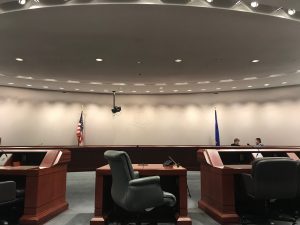Returning from recess, the Higher Education and Advancement Committee opened the floor to Keith Norton, the Acting Executive Director of Higher Education in the State of Connecticut. This office is responsible for serving individuals of higher education, including postsecondary career schools and colleges that finances and programming Connecticut State scholarships and aid. In the Public Hearing, Norton reflected on the passing of Senate Bill 142, Senate Bill 145, House bill 5135, and House Bill 5136. His proposal, on behalf of the Office of Higher Education, acknowledged the agreement to take on responsibilities given by the new changes.
Specifically, the changes made to Senate Bill 142: An Act Concerning Acceptance of Institutional Accreditation of Private Occupational Schools by the Office of Higher Education were a primary concern of the senators and representatives of the committee that were present. As a result to the changes, the Office of Higher Education is granted “the ability to provide assistance to students and school administration to help facilitate solutions to…problems in the context of Connecticut’s own standards” if a postsecondary school already established accreditors lack effectiveness of assistance. The newly recognized responsibility of the Office of Higher Education is “to ensure that students and families are able to access the high-quality education they expect from an approved Connecticut school.”
Democratic Senator Bye questioned Norton and the idea of post occupational education with skepticism. Bye asked “What is the completion rate of these schools?” and later, “How do we know that students are not being scammed out of their money and are receiving an education that will benefit their careers?” Her concerns were met with Norton’s uncertainty to be able to provide the answers that would instill confidence in Bye to believe in postsecondary occupational education and his agency as he could not provide figures of completion rates or demonstrate that students after graduation were successful in their respective fields.
Bye, however, was not the only Senator in attendance to have concerns. Representative Mushinsky also directed many unanswerable questions towards Norton. She questioned Norton on the actual success rates of these postsecondary educational schools as she raised concerns with the preparedness of the students to enter the workforce. Norton responded that the students would learn to the test to ensure that the students would have the skills necessary to be able to pass the test to gain their certifications in their respective fields. Muchinsky continued to ask whether this type of schooling may just be setting students up for failure and how beneficial it truly was to attend this school if they were not prepared to enter the workforce post graduation. Muchinsky also demanded that Norton communicate with the Department of Labor for at least four times a year to ensure that the fields of the schools were proportional to job availability post graduation.
This meeting demonstrated the difficulty in providing the best, effective policies for higher education.
To learn more about the Higher Education and Employment Advancement Committee, click here.
To read Senate Bill 142, click here.
Inside of Legislative Office Building Room 1E.
Outside of Room 1E.

